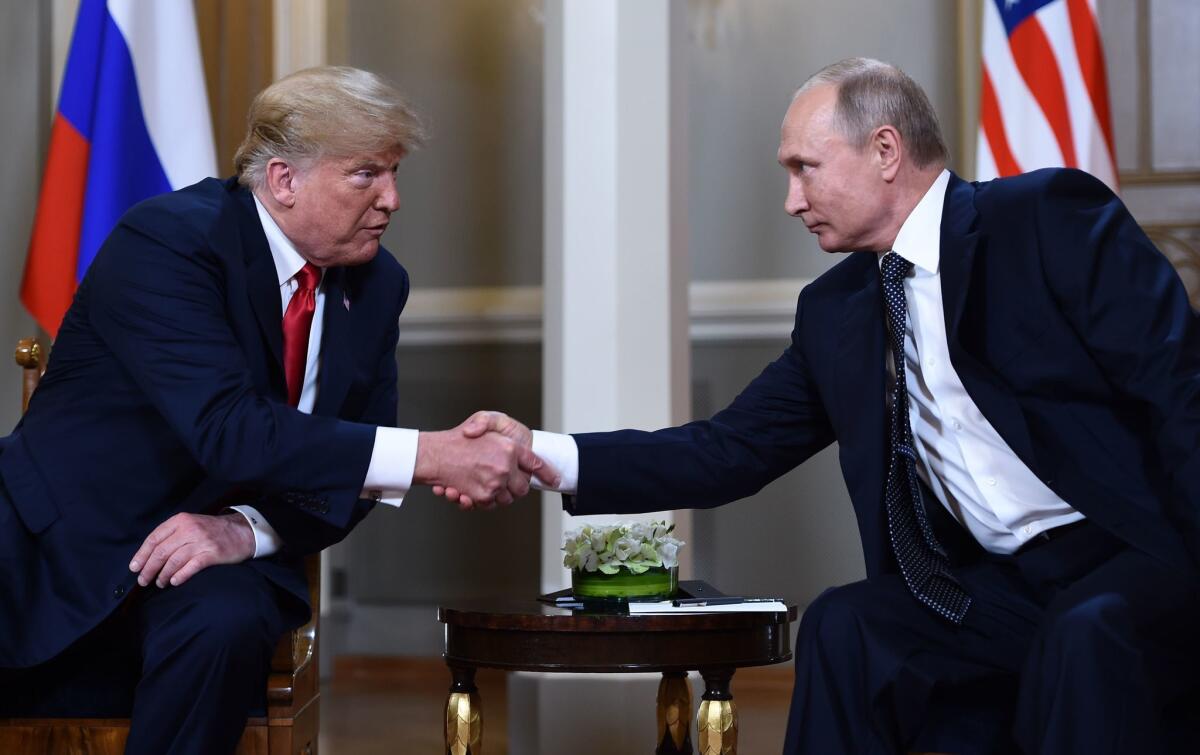For Trump, foreign policy has soured, too

- Share via
WASHINGTON — When President Trump launched his reelection campaign, he hoped to run, in part, on a record of foreign policy success.
He told voters he was making progress toward a big trade deal with China: “The biggest deal ever,” he promised.
He was holding peace talks with North Korea aimed at dismantling Kim Jong Un’s nuclear arsenal and ending a 70-year-old conflict.
Democrats, unsatisfied by briefings on intelligence that Russia offered the Afghan Taliban bounties to kill U.S. troops, demand further investigation.
He even held out hope for a new nuclear deal with Iran — one he said would be better than the pact his predecessor, Barack Obama, signed in 2015.
“Our country is respected again,” the president boasted in February. “We were not a respected nation.”
That seems a long time ago now.
Trump’s diplomatic successes, which were rarely as momentous as he claimed, have mostly evaporated. Foreign policy has become a source of trouble for his reelection campaign instead of a strength.
The president’s personal summitry with Kim Jong Un has deadlocked; the North Korean leader is testing missiles and manufacturing nuclear warheads again.
His trade agreement with China turned out to be little more than a short-term deal to sell U.S. agricultural products, not the big structural change his China hawks yearned for.
The president’s harsh economic sanctions have succeeded in punishing Iran’s economy, but have produced no progress toward a deal to tighten limits on Tehran’s military.
As for respect, Trump’s chaotic response to the coronavirus has made the United States a global example of how not to fight a pandemic. This week the European Union announced that it was reopening to tourists from 15 “safe” countries including Canada, Japan, South Korea and Rwanda — but not the United States.
Respect? Americans can’t even vacation in Paris anymore.
Even worse for a president whose go-to adjective is “strong,” embittered ex-aides and in-house leakers keep suggesting that when Trump gets into negotiations with autocratic chiefs of state, he’s not a tough guy after all.
His former national security advisor John Bolton denounced the president for pursuing cozy deals with his favorite autocrats, China’s Xi Jinping, Russia’s Vladimir Putin and Turkey’s Recep Tayyip Erdogan.
“There was “no coherent basis, no strategy,” Bolton complained after writing his tell-all book. “There really isn’t any guiding principle that I was able to discern other than what’s good for Donald Trump’s reelection.”
This week, reports emerged that one of Putin’s intelligence agencies offered bounties to Afghanistan’s Taliban for killing American troops. The reports reached the desk of Trump’s current national security advisor, Robert C. O’Brien, but the president denied knowing anything.
No matter how the controversy turns out, it bolsters the picture of a foreign policy team in disarray.
And voters, who rarely pay close attention to foreign policy even without the distraction of a pandemic, appear to have noticed.
A Gallup poll in mid-June found that public approval of Trump’s job performance on foreign policy has sagged to 41%, significantly lower than the 47% who approved of his handling of the nation’s economy.
Democrats and their presumptive presidential nominee, Joe Biden, have noticed Trump’s vulnerability on these issues, too.
Last week, the Democratic National Committee launched a 30-second television commercial in swing states deriding Trump’s performance on trade.
“Trump said he’d get tough on China,” a narrator intones. “He didn’t get tough. He got played.”
The Trump campaign has fired back with a commercial calling Biden “China’s puppet” and reviving charges that his son, Hunter Biden, was paid suspiciously large sums by a Chinese firm.
That’s the closest this race has come to a debate on international affairs — a barroom brawl over who is softer on China.
“A presidential campaign is a bad place to look for a serious discussion of foreign policy,” observed Richard N. Haass, president of the Council on Foreign Relations.
China policy won’t be the deciding issue in November’s presidential election — far from it.
Voters rank other problems higher on their priority lists, beginning with the pandemic, race relations and the economy.
But this argument isn’t about the nuances of foreign affairs; there’s nary a nuance in sight. It’s a slanging match about competence, toughness and strength.
Historically, Republicans have had an advantage among voters on national security issues; they’re traditionally the party of military strength and diplomatic toughness.
Trump appears to have squandered that advantage. We may be seeing a historical anomaly: a campaign in which voters give the Democratic candidate the benefit of the doubt on toughness in foreign policy.
More to Read
Get the L.A. Times Politics newsletter
Deeply reported insights into legislation, politics and policy from Sacramento, Washington and beyond. In your inbox twice per week.
You may occasionally receive promotional content from the Los Angeles Times.












